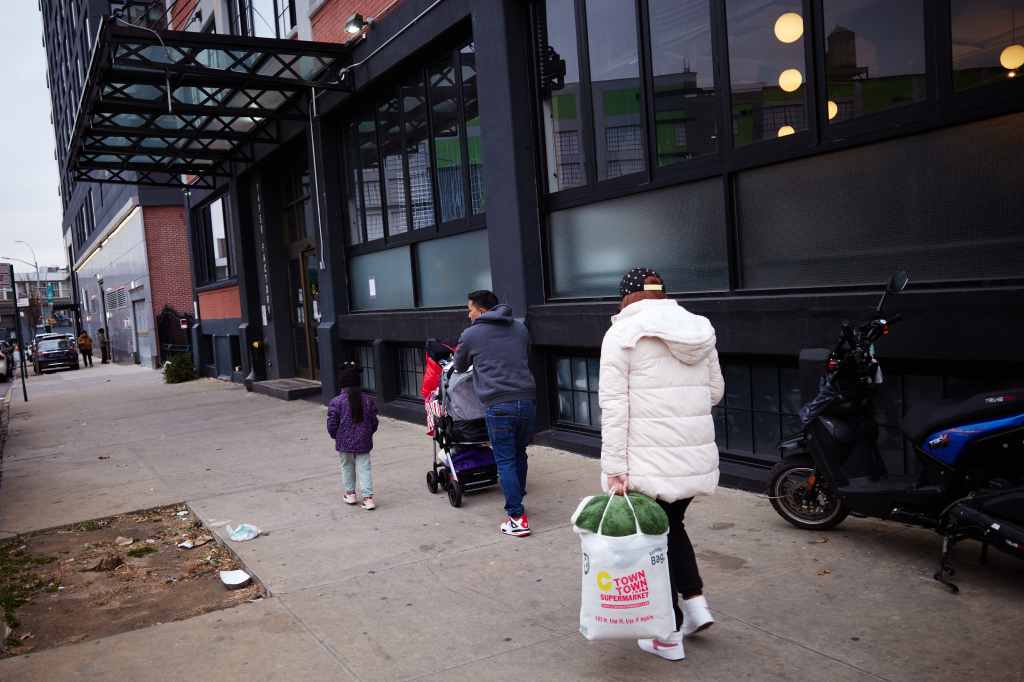
Migrants Homeless Shelters Evictions A Deep Dive
Migrants homeless shelters evictions are a complex issue with far-reaching consequences. This blog post explores the impact of evictions on migrant communities, examining the challenges faced by those seeking shelter and the strategies for preventing such displacement. We’ll delve into the systemic factors contributing to migrant vulnerability, highlighting the needs of families and individuals, and offering potential solutions for a more supportive and equitable system.
From the historical context of evictions targeting migrant communities to the socioeconomic and mental health consequences, this post covers the full spectrum of this crucial topic. We will explore the specific challenges of providing culturally sensitive support, analyze the varying needs of different migrant groups, and examine the role of government policies in addressing these issues. Ultimately, we aim to understand how we can create a more supportive environment for migrants facing eviction and homelessness.
The Impact of Evictions on Migrants

Evictions are a pervasive issue affecting numerous communities, including migrant populations. These forced removals have far-reaching consequences, impacting not only housing but also the socioeconomic well-being and mental health of individuals and families. Understanding the multifaceted impact of evictions on migrants is crucial for developing effective support systems and policies. The historical context, socioeconomic ramifications, and legal frameworks surrounding these evictions are essential to comprehend the depth of this problem.Eviction is not a new phenomenon for migrant communities.
Throughout history, various migrant groups have faced discriminatory practices and targeted evictions, often rooted in xenophobia, economic anxieties, and social prejudices. These historical patterns continue to shape the experiences of contemporary migrant populations, highlighting the need for ongoing advocacy and support.
Historical Overview of Evictions Targeting Migrant Communities
Migrant communities have historically been disproportionately affected by evictions. Early examples include the displacement of agricultural workers in the US during the early 20th century, often due to labor disputes or perceived threats to local employment. Similarly, waves of immigration to industrial centers in Europe and North America have been accompanied by periods of heightened eviction rates. In some cases, these evictions have been tied to discriminatory housing practices, while in others, they reflect broader economic shifts that disproportionately impact vulnerable populations.
Socioeconomic Consequences of Evictions on Migrant Families
Evictions have severe socioeconomic consequences for migrant families. Loss of housing leads to instability, disrupting access to essential services like healthcare and education for children. This instability often results in lost employment opportunities, as migrants struggle to find stable housing. The financial strain caused by eviction can also lead to debt accumulation, further marginalizing families and hindering their ability to rebuild their lives.
Evictions from migrant homeless shelters are a complex issue, often tied to bureaucratic hurdles and the need for quick solutions. This frequently involves the sensitive topic of naming conventions, such as determining the last name for a child born to a migrant parent, especially when considering legal processes and cultural nuances. Learning more about these practices, like the rules surrounding apellido bebe madre padre , can provide a deeper understanding of the challenges faced by those seeking shelter and stability.
Ultimately, these factors all play a part in the broader issue of supporting migrant communities experiencing homelessness and ensuring their rights are protected.
For instance, a family evicted from their apartment might face difficulty finding new affordable housing, which in turn affects their ability to secure employment in a new location, leading to a vicious cycle of poverty.
Potential Mental Health Effects of Evictions on Migrant Individuals
The trauma associated with eviction can have profound mental health consequences for migrant individuals. Forced displacement can trigger feelings of fear, anxiety, and depression. The loss of a stable home, often a symbol of safety and belonging, can exacerbate existing mental health challenges. The stress of navigating unfamiliar legal systems and seeking new housing options can be overwhelming, especially for those who are already experiencing social isolation or cultural barriers.
For example, the uncertainty of finding new housing can lead to increased stress and anxiety, affecting the mental well-being of individuals and their families.
Correlation Between Eviction Rates and Access to Homeless Shelters for Migrants
High eviction rates often correlate with limited access to homeless shelters for migrants. If shelters are overwhelmed or lack adequate resources, migrants facing eviction may have nowhere to turn. This situation can lead to increased homelessness and exacerbate existing vulnerabilities. For example, a surge in evictions during a period of economic downturn might lead to a greater demand for shelter services, outstripping the capacity of existing facilities, leading to longer wait times and limited options for migrants.
Evictions from migrant homeless shelters are a tough issue, highlighting the complex needs of vulnerable populations. It makes you think about the ethics of certain practices, like the recent discussion around the purchase of stranger letters. Stranger letters purchase ethics raise important questions about the commodification of personal stories, which, in turn, reminds us of the importance of supporting these shelters and advocating for fair housing policies for migrants facing eviction.
Comparison and Contrast of Experiences of Different Migrant Groups Facing Evictions
The experiences of different migrant groups facing evictions can vary significantly. Factors such as their country of origin, legal status, and language barriers can influence their access to resources and support services. For instance, undocumented migrants often face greater challenges in accessing legal aid and financial assistance compared to those with legal residency. Similarly, migrants who are new to the country may lack the social networks and language skills necessary to navigate the eviction process.
It is important to recognize that these variations highlight the need for tailored support systems.
Legal Frameworks Surrounding Evictions and Their Impact on Migrants
Legal frameworks surrounding evictions can have a substantial impact on migrants. Variations in eviction laws across jurisdictions and countries can create significant challenges for migrants who are unfamiliar with local regulations. Migrants may not understand their rights, or the processes required to challenge an eviction notice. In some cases, legal loopholes or inconsistencies in enforcement can exacerbate the vulnerability of migrant populations.
For example, the lack of clear legal protections for renters in certain areas can leave migrants more susceptible to unfair evictions.
Common Reasons for Evictions Faced by Migrants
| Reason | Description |
|---|---|
| Housing Violations | Failure to maintain the property, causing damage, or violating health codes. |
| Lease Violations | Breaching the terms of the lease agreement, such as late rent payments or subletting without permission. |
| Non-Payment of Rent | Inability to meet rent obligations due to financial hardship or job loss. |
| Illegal Activity | Engaging in activities that violate local ordinances or housing regulations. |
| Family Disputes | Conflicts within the household leading to eviction. |
Types of Support Services Available to Migrants Facing Eviction
Support services for migrants facing eviction are crucial in mitigating the negative consequences of displacement. These services aim to provide assistance throughout the process, from legal aid to financial support and temporary housing.
| Service | Description |
|---|---|
| Legal Aid | Legal representation and assistance navigating the eviction process. |
| Financial Assistance | Temporary financial support to cover rent or move-out costs. |
| Temporary Housing | Short-term accommodation to provide a safe place to stay during the transition. |
| Community Support Organizations | Guidance and resources from organizations dedicated to assisting migrants. |
| Language Assistance | Interpreters to bridge communication gaps. |
Homeless Shelters and Migrant Needs
Navigating the complexities of homelessness is challenging for anyone, but for migrant individuals, the journey is often fraught with unique obstacles. These obstacles extend beyond the basic necessities of shelter and food, encompassing cultural barriers, language difficulties, and a lack of familiarity with the host country’s systems. Understanding these specific needs is crucial for providing effective support and fostering successful integration.Homeless shelters play a vital role in supporting vulnerable populations, including migrants.
However, the effectiveness of these shelters hinges on their ability to address the specific needs of migrant individuals and families. This involves creating an environment that is not only safe and supportive but also culturally sensitive and respectful of diverse backgrounds.
Challenges Faced by Migrant Individuals Seeking Shelter
Migrants face significant hurdles when seeking shelter. Language barriers often prevent them from accessing crucial information and services. Furthermore, a lack of familiarity with local laws, regulations, and procedures can impede their ability to navigate the shelter system effectively. Cultural differences can also contribute to misunderstandings and create barriers to successful integration into shelter programs. Many migrants may have experienced trauma or loss, adding further layers of complexity to their situation.
This can lead to feelings of isolation, anxiety, and distrust, hindering their ability to engage with shelter staff and other residents.
Evictions from migrant homeless shelters are a pressing issue, especially when considering the complex economic factors at play. For instance, the booming electric vehicle (EV) sector in Hefei, China, as detailed in this article about china hefei ev city economy , is creating job opportunities but also contributing to rising housing costs and potentially affecting vulnerable populations. This ultimately exacerbates the struggle for migrants trying to find affordable housing and stable shelter.
Specific Needs of Migrant Families in Homeless Shelters
Migrant families often require specialized support due to the unique challenges they face. These families may need assistance with childcare, language acquisition, and navigating the educational system for their children. They might also require access to culturally appropriate resources, including food that aligns with their dietary needs and traditions. In addition, they may need assistance in reuniting with family members or accessing legal aid to resolve immigration-related issues.
Culturally Sensitive Support for Migrants in Shelters
Providing culturally sensitive support is paramount in ensuring the well-being of migrant individuals and families. Shelter staff must be trained to understand and respect the diverse cultural backgrounds represented in their communities. This includes recognizing the importance of different communication styles, religious practices, and family structures. Using interpreters and translation services is crucial to ensure clear communication and address any misunderstandings.
Effective Strategies for Integrating Migrants into Shelter Programs
Successful integration of migrants into shelter programs requires a multi-faceted approach. It’s essential to establish clear communication channels, utilizing interpreters and translation services to facilitate understanding. Creating culturally sensitive support groups and providing information in various languages can foster a sense of community and belonging. Collaborating with local community organizations and cultural centers can provide migrants with access to additional resources and support.
Providing workshops on local customs, laws, and procedures can empower migrants to navigate their new environment.
Evictions from migrant homeless shelters are a pressing issue, often leaving vulnerable individuals with nowhere to go. The recent news about Chris Young’s charges being dropped, chris young charges dropped , highlights the complexities of legal systems and their impact on individuals. These situations unfortunately often mirror the struggles faced by those seeking refuge and housing, underscoring the urgent need for support and solutions to the crisis surrounding migrant homeless shelters.
Comparison of Services Offered by Different Homeless Shelters
The services offered by different homeless shelters for migrants vary significantly. Some shelters may have dedicated programs specifically for migrant families, while others may provide limited support. Some shelters may prioritize immediate needs like providing food and shelter, while others might focus on long-term solutions such as job training and access to legal aid. This difference in approach often reflects the resources and expertise available to the specific shelter.
Requirements and Procedures for Accessing Homeless Shelters
| Requirement | Procedure |
|---|---|
| Proof of Identity | Valid passport, national ID card, or other official documentation |
| Proof of Address | Utility bills, lease agreement, or other documents verifying residency |
| Immigration Status | Documentation from immigration authorities, if applicable |
| Emergency Contact Information | Contact details of a responsible person who can be reached in case of emergencies |
Resources Available for Migrants in Shelters
| Resource Type | Description |
|---|---|
| Language Assistance | Interpreters, translation services, multilingual staff |
| Translation Services | Documents, forms, and information translated into various languages |
| Legal Representation | Access to legal aid or referrals to legal services organizations |
| Cultural Support Groups | Workshops, seminars, or community gatherings to help migrants adjust |
| Educational Resources | Workshops or resources for acquiring local language skills, education information |
Eviction Prevention Strategies for Migrants: Migrants Homeless Shelters Evictions
Evictions disproportionately affect migrant communities, often exacerbating existing vulnerabilities and hindering their integration into host societies. These involuntary removals can lead to instability, loss of essential resources, and increased risk of further hardship. Understanding the root causes of these evictions is crucial to developing effective prevention strategies.Addressing the issue requires a multifaceted approach that encompasses legal aid, financial support, and community-based initiatives.
This approach will focus on strengthening migrant communities’ resilience and promoting their well-being.
Factors Contributing to Evictions Among Migrants
Migrants often face unique challenges that increase their vulnerability to eviction. These include limited access to legal resources, language barriers, and a lack of understanding of local housing regulations. Furthermore, economic instability, such as low wages and fluctuating employment opportunities, can make it difficult for migrants to maintain stable housing. Exploitation and fraudulent practices within the rental market, where migrants are often targeted, further contribute to the issue.
In some cases, discriminatory practices based on nationality or immigration status also play a significant role.
Community-Based Initiatives Preventing Evictions
Many community organizations and grassroots initiatives actively work to prevent evictions. These efforts often include providing legal aid to navigate the complexities of housing laws, financial assistance programs to help cover rent arrears, and support groups to connect migrants with resources and build a sense of community. One example is a program offering workshops on landlord-tenant rights, empowering migrants with the knowledge to protect their housing rights.
Another example includes a community center providing resources such as job training and financial literacy courses, directly addressing the economic factors that contribute to eviction risk.
Strategies to Address Root Causes of Evictions
| Root Cause | Strategy |
|---|---|
| Limited Access to Affordable Housing | Develop and implement policies to increase the supply of affordable housing units, especially those specifically designed for migrant families. Expand rental assistance programs and explore innovative financing mechanisms to make housing more accessible. |
| Low Income and Financial Instability | Implement income support programs targeted at migrant workers, providing temporary financial assistance to cover rent arrears or to support relocation. Establish financial literacy programs that equip migrants with essential skills for managing finances. |
| Lack of Legal Assistance | Increase funding for legal aid organizations dedicated to representing migrant tenants. Provide culturally sensitive legal assistance, addressing language barriers and ensuring clear explanations of legal procedures. |
| Exploitation in the Rental Market | Implement stronger regulations and enforcement mechanisms to combat fraudulent and exploitative rental practices. Establish complaint procedures and provide resources to help migrants report and address such issues. |
| Discrimination | Develop and enforce anti-discrimination policies within the housing sector. Promote awareness and education about migrant rights and combat negative stereotypes. |
Affordable Housing Options for Migrant Families
Creating affordable housing specifically designed for migrant families requires careful consideration of their unique needs. These housing units should offer culturally sensitive amenities, language support, and access to community resources. For example, some buildings could include shared kitchens or spaces for language classes. Developing rental subsidies targeted at families could also provide much-needed financial support.
Government Policies Preventing Evictions
Government policies play a crucial role in preventing evictions for migrants. These policies should include expanding affordable housing options, increasing rental assistance programs, and enforcing anti-discrimination laws. Providing funding to support legal aid services for migrant tenants is also essential. Implementing regulations to combat exploitative practices within the rental market is also necessary to create a safer environment for migrants.
Organizations Supporting Migrants Facing Eviction
Numerous organizations offer support to migrants facing eviction. These include local non-profit organizations, community centers, and legal aid societies. Many of these organizations provide legal assistance, financial aid, and other crucial support services. For instance, local community centers often host workshops on landlord-tenant rights.
Partnerships for Preventing Evictions
Strong partnerships between government agencies, NGOs, and community organizations are essential to address the complex issue of migrant evictions. These partnerships can facilitate the efficient delivery of services, leverage resources, and create a more comprehensive approach to preventing evictions. Such collaborations could involve joint funding initiatives, coordinated outreach programs, and shared resources to better serve migrant populations.
Support Systems for Preventing Evictions
| Type of Support | Description |
|---|---|
| Financial Aid | Providing temporary financial assistance to cover rent arrears, relocation costs, or other housing-related expenses. |
| Legal Aid | Offering legal representation and support to navigate housing laws and procedures. |
| Advocacy | Working to influence policies and practices to create a more supportive environment for migrants. |
| Language Support | Providing interpretation and translation services to ensure migrants understand their rights and responsibilities. |
| Community Resources | Connecting migrants with community centers, support groups, and other resources to build community and foster a sense of belonging. |
The Interconnectedness of Eviction, Migration, and Shelter

Navigating the complexities of migration often leads individuals and families into vulnerable situations, making them susceptible to various hardships. Eviction, unfortunately, is a frequent consequence, highlighting the urgent need for robust support systems and comprehensive strategies to protect these vulnerable populations. This interconnectedness demands a deep understanding of the systemic factors at play, the diverse experiences of migrants, and the crucial role of effective shelter systems in mitigating the risks.Systemic factors often contribute to the vulnerability of migrants to evictions.
These include limited access to legal resources, language barriers, lack of awareness of rights, and a lack of documentation. Economic precarity, coupled with discrimination in the rental market, further exacerbates the problem. Many migrants face challenges in securing stable housing due to the combination of these factors, and evictions become a frequent occurrence.
Systemic Factors Contributing to Migrant Eviction Vulnerability
Limited access to legal resources, language barriers, and a lack of awareness of tenant rights often leave migrants vulnerable to exploitation and unfair eviction practices. Economic precarity and discrimination in the rental market further compound these issues. Many migrants are unfamiliar with local laws and regulations, making them more susceptible to unscrupulous landlords or agents.
Evictions from migrant homeless shelters are a heartbreaking issue, often leaving vulnerable individuals without a safe place to stay. While we grapple with these tough situations, it’s interesting to consider how companies like KKR, a private equity firm, are approaching employee ownership models. KKR private equity employee ownership could potentially offer insights into alternative approaches to social responsibility, which could, in turn, help to develop more comprehensive support systems for those experiencing homelessness.
Ultimately, the goal remains the same: creating more stable and supportive environments for migrants.
Comparative Experiences of Migrants from Different Regions
The experiences of migrants from different countries and regions regarding evictions and shelter vary significantly. For instance, migrants from conflict zones may face heightened vulnerability due to trauma and displacement, leading to precarious living situations and an increased risk of eviction. Similarly, economic migrants might struggle to find stable housing due to financial constraints and lack of access to support networks.
Understanding these variations is crucial to developing tailored support systems.
Consequences of Inadequate Shelter Systems
Inadequate shelter systems can have severe consequences for migrant communities. Overcrowding, lack of sanitation, and inadequate access to essential services can lead to health issues, mental health challenges, and social isolation. Without appropriate support, migrant children and families may struggle to thrive in these conditions.
Role of Immigration Policies in Housing Access
Immigration policies play a critical role in affecting migrants’ access to housing and shelter. Policies that restrict access to legal status or limit work opportunities can restrict access to stable housing. Moreover, policies that do not adequately address the needs of migrants can exacerbate the vulnerability of these communities.
Challenges Faced by Migrant Children
Migrant children are particularly vulnerable to the effects of evictions and lack of access to shelters. The disruption of their education, the loss of a stable environment, and the psychological impact can have long-term consequences. These challenges highlight the urgent need for specialized support programs for migrant children.
Potential Solutions to Address Interconnectedness, Migrants homeless shelters evictions
Addressing the interconnectedness of eviction, migration, and shelter requires a multi-faceted approach. This includes strengthening legal aid services tailored to the needs of migrants, providing language assistance, and raising awareness of tenant rights. Furthermore, community-based support programs, coupled with affordable housing initiatives, are crucial in providing sustainable solutions.
Potential Long-Term Effects of Evictions on Migrant Families
| Area | Potential Long-Term Effects |
|---|---|
| Education | Disrupted schooling, decreased academic performance, increased risk of dropping out |
| Employment | Reduced employment opportunities, difficulties in securing stable jobs, decreased income |
| Social Integration | Social isolation, difficulty in building relationships, limited access to social services |
| Mental Health | Increased stress, anxiety, depression, and trauma |
Community Support Programs for Migrant Families
| Program Type | Description |
|---|---|
| Legal Aid Clinics | Provide legal assistance on housing matters, tenant rights, and eviction prevention |
| Language Support Programs | Offer language classes and translation services to help migrants navigate housing procedures |
| Housing Assistance Programs | Provide financial assistance and resources for finding and maintaining affordable housing |
| Community Centers | Offer a safe space for social interaction, cultural exchange, and access to resources |
| Childcare Services | Provide safe and affordable childcare options to allow parents to access job opportunities or housing support services |
Outcome Summary
In conclusion, the interconnectedness of evictions, migration, and shelter systems is undeniable. This post has highlighted the multifaceted nature of this issue, emphasizing the need for comprehensive solutions that address the root causes of displacement and support migrants throughout their journey. From affordable housing initiatives to culturally sensitive shelter programs, the path forward requires collaboration between governments, NGOs, and community organizations.
Ultimately, creating a more supportive and inclusive environment for migrant communities requires a commitment to preventing evictions and providing access to adequate housing and support services.
Common Queries
What are some common reasons for eviction among migrant families?
Common reasons include housing violations, lease violations, and non-payment of rent, often exacerbated by financial instability and limited legal knowledge.
What kinds of support services are available to help migrants facing eviction?
These can include legal aid, financial assistance, and temporary housing. The specific resources available can vary depending on location and the specific needs of the migrant community.
How do immigration policies affect access to housing and shelter for migrants?
Immigration policies can significantly impact access to housing and shelter. Policies that restrict access to legal residency or work permits can hinder migrants’ ability to secure stable housing and income.
What are some potential long-term effects of evictions on migrant families?
Evictions can lead to disruptions in education, employment, and social integration. These disruptions can have lasting consequences for individuals and families, impacting their overall well-being and future opportunities.




